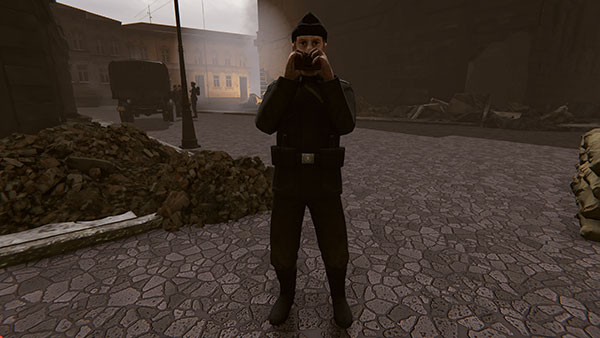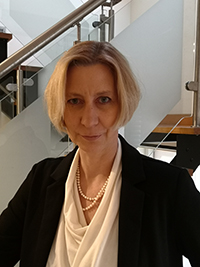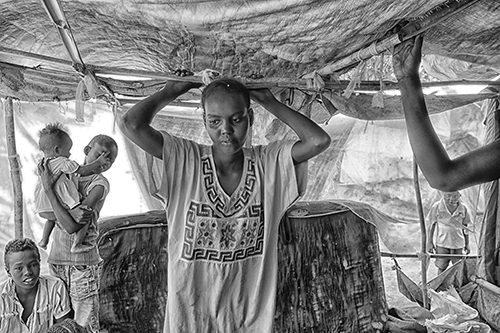Monday, 17 January 2022
A major exhibition that gives visitors the chance to literally step into a photograph from the Holocaust using virtual reality technology is opening at Lakeside Arts on University Park in Nottingham next week.
The Eye as Witness – Recording the Holocaust is a free-to-enter exhibition put together by historians and VR developers at the University of Nottingham, and the National Holocaust Centre and Museum. The immersive multimedia experience is designed to challenge traditional ways of witnessing and recording the Holocaust and to promote critical thinking on racism, hatred and ‘fake news’ in today’s digital world.
Highlights include:
- IMMERSIVE VR EXPERIENCE: Walk into a Nazi-made Holocaust photo to see the photographer in action.
- HOLOCAUST VICTIMS’ OWN PHOTOS
- INTERACTIVE TESTIMONY via the Forever Project.
- POWERFUL VIDEO INSTALLATION created by Swedish artist Lina Selander.
- INTERACTIVE PHOTO COLLAGE challenging stereotypical images then and now.

A second exhibition running alongside the Eye as Witness is called Fragments of Sudan and offers a contemporary view of wartime photography. The work of the award-winning Greek-born photojournalist Nerris Markogiannis focusses on people affected by the ongoing civil war in Sudan. The display offers a poignant and tragic reminder that ethnic cleansing, mass genocide and enforced displacement of people continues across the world.
The Eye as Witness exhibition features real and virtual Nazi propaganda photos of Holocaust victims. Using state-of-the-art VR computer simulation technology and techniques visitors will be able to ‘walk into’ a photograph to see the propaganda photographer in the act of taking the picture. They can explore the space to consider the context of the image and find out what was kept out of frame. The VR allows people to view snapshots of this traumatic period in modern history in a private, personal and visceral way.
There are further interactive displays which lead the viewer on a journey of discovery about the circumstances of each picture and whether the photography is propaganda or original photography belonging to the victims.
 Professor Maiken Umbach, Department of History, University of Nottingham
Professor Maiken Umbach, Department of History, University of Nottingham
Professor Maiken Umbach, from the University’s Department of History, said: “The urgency of taking a fresh look at the darkest moment of human history cannot be underestimated. We have relied too much on Nazi propaganda photos to visualise the horrors of the Holocaust. Focusing on the photos and testimonies of victims helps us understand issues that are sadly becoming increasingly pressing in the modern world, such as Anti-Semitism, racism, fake news, and prejudice.”
Professor Umbach has written a blog on Holocaust education and photography called 'Through whose eyes are we seeing the past?'.
The exhibition includes photos that are rarely seen today – secret photos taken by Jewish people and members of the anti-Nazi resistance, who, at great risk to themselves, used the camera to record the story as they saw it. Although these images would not change their fate, taking photos did give victims a degree of control over the way in which their horrific experiences were witnessed by future generations. The visual testimony and a rare example of a written note from the camps is combined with the words of survivors speaking to us today, through an interactive recording technology known as the Forever Project.
 Marc Cave, National Holocaust Centre and Museum
Marc Cave, National Holocaust Centre and Museum
Marc Cave, CEO of the National Holocaust Centre and Museum, said: “When you see an image or video posted on Twitter or Facebook today - of a victim of war or member of a particular minority group - ask yourself who recorded it and why? If pictures are worth a thousand words, then fake news is 1,000 times more sinister in photographic form. More than 75 years after end of the Holocaust, this exhibition invites critical thinking. It asks you to understand the visual cunning of the Nazis and how it helped permeate and legitimise anti-Jewish hate — and to think critically about the same propaganda techniques being used on social media today by the Hard Left and the Hard Right alike”.
 © Nerris Markogiannis
© Nerris Markogiannis
In Fragments of Sudan, showing alongside the Holocaust exhibition at the Djanogly Gallery, Nerris Markogiannis’s photography captures the people affected by the civil war in Sudan who have been forced to flee to United Nations refugee camps in the country. Nerris has been working for the UN Peacekeeping Operations and travelling with their forces in the region. His photography is informed by a deep engagement with the history and ethics of ‘victim photography’. The resulting images are never graphic or shocking; they grapple with harrowing topics subtly and sensitively. They are testament to the photographer’s search for a visual language that uses aesthetics to slow down the gaze, and to invite an empathetic engagement with histories of suffering and resilience.
The Eye as Witness – Recording the Holocaust and Fragments of Sudan are at the Djanogly Gallery, Lakeside Arts, University Park, Nottingham NG from Saturday 22nd January to Sunday 13th March 2022.
Story credits
For more information, please contact Mária Konyelicska, Marketing and Communications Manager, Lakeside Arts via email maria.konyelicska@nottingham.ac.uk or Emma Rayner, Media Relations Manager on 07738 291242 or emma.rayner@nottingham.ac.uk
Notes to editors:
About the University of Nottingham
Ranked 97 in the world and 17th in the UK by the QS World University Rankings, the University of Nottingham is a founding member of Russell Group of research-intensive universities. Studying at the University of Nottingham is a life-changing experience, and we pride ourselves on unlocking the potential of our students. We have a pioneering spirit, expressed in the vision of our founder Sir Jesse Boot, which has seen us lead the way in establishing campuses in China and Malaysia - part of a globally connected network of education, research and industrial engagement.
Nottingham was crowned Sports University of the Year by The Times and Sunday Times Good University Guide 2024 – the third time it has been given the honour since 2018 – and by the Daily Mail University Guide 2024.
The university is among the best universities in the UK for the strength of our research, positioned seventh for research power in the UK according to REF 2021. The birthplace of discoveries such as MRI and ibuprofen, our innovations transform lives and tackle global problems such as sustainable food supplies, ending modern slavery, developing greener transport, and reducing reliance on fossil fuels.
The university is a major employer and industry partner - locally and globally - and our graduates are the third most targeted by the UK's top employers, according to The Graduate Market in 2024 report by High Fliers Research.
We lead the Universities for Nottingham initiative, in partnership with Nottingham Trent University, a pioneering collaboration between the city’s two world-class institutions to improve levels of prosperity, opportunity, sustainability, health and wellbeing for residents in the city and region we are proud to call home.
More news…